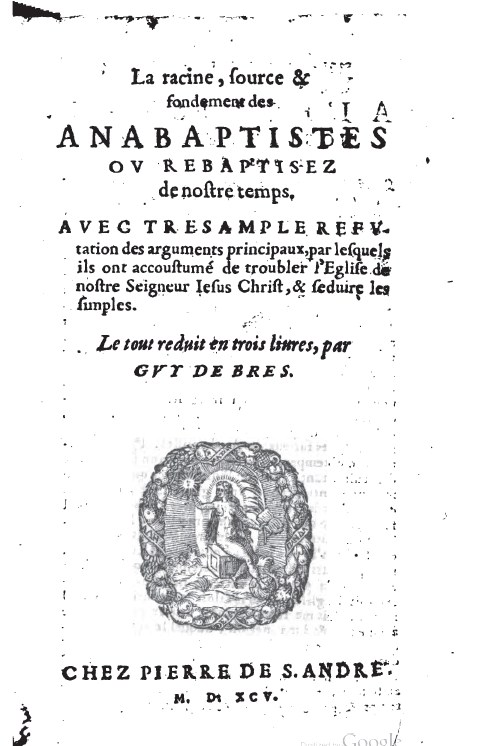Calvin and de Brès


Continuing our celebration of the 450th birthday of the Belgic Confession, here’s another small piece I wrote a couple of years back…
***************
The relationship between John Calvin and Guy (or Guido) de Brès has often been explored. In his book on the Belgic Confession, Gootjes has a chapter on Calvin and the Confession and this also discusses de Brès’ relationship with Calvin. He also has all the references to the other research done on this question (Strauss, Rutgers, etc.). He also reproduces the primary source document which informs us that the library of de Brès included at least one book of Calvin.
Although the Belgic Confession is strongly influenced by Calvin, it is remarkable that in his other writings, de Brès never directly refers to Calvin (at least not that I have been able to determine). The only exception I have found is in the preface to his 1565 book against the Anabaptists, La racine, source et fondement des Anabaptistes (The Root, Source and Foundation of the Anabaptists). But even there, he only briefly refers to Calvin and does not quote him. In fact, the only Reformer mentioned with any frequency is John a Lasco, but only because Menno Simons wrote a book against him.
However, the fingerprints of Calvin are everywhere in the writings of de Brès. As an example, in La racine, de Brès argues at length against the Anabaptist rejection of infant baptism. At a certain point, he appears to reproduce the argument of Calvin in Institutes 4.16.8. The Anabaptists asserted that there was no clear instance of infants being baptized by the apostles. Calvin replies, “If such arguments were valid, women should similarly be barred from the Lord’s Supper, since we do not read that they were admitted to it in the apostolic age; but here we are content with the rule of faith.” Likewise, de Brès argued that we defraud or cheat the intention of the Lord when we prohibit infants from being baptized, no less than if we were to bar women from the Lord’s Supper simply because there is no example of them partaking in Scripture. Now it could be that this argument did not originate with Calvin or it could be that de Brès learned it from someone else (perhaps Pierre Viret or Theodore Beza under whom he studied in Lausanne). But the similarities do suggest that de Brès was self-consciously following Calvin here.
Some day it would be great to see an extensive study of de Brès to determine more precisely the exact parameters of Calvin’s influence. Perhaps such a study would help to give us a reasonable idea of what work(s) of Calvin may have been in de Brès’ library. We may also be able to ascertain whether or not de Brès actually sat under the teaching of Calvin at some point (though it seems likely). Much research remains to be done in the area of de Brès studies.


